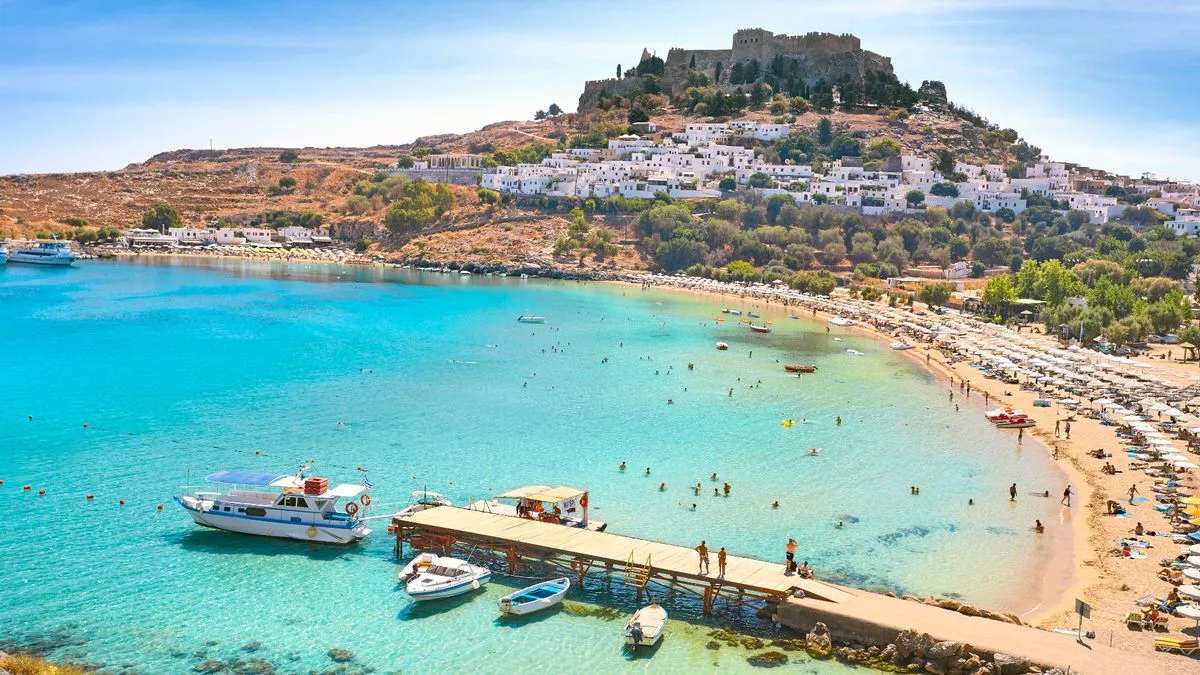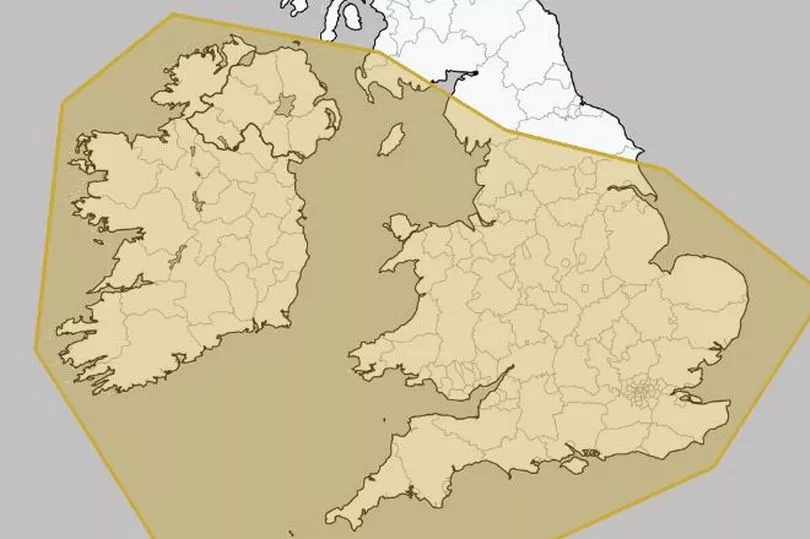Table of Contents
ToggleWhy Are blue flag greek beaches lost their Prestige?
Image Credit: The Mirror
Introduction:
Greece, a nation synonymous with azure waters, golden sands, and sun-soaked islands, has long been a frontrunner in the Blue Flag rankings. This prestigious certification has made Greek beaches a magnet for millions of tourists worldwide. However, recent trends indicate that several Blue Flag Greek beaches are losing their prestige. So, what’s causing this decline? Is it environmental degradation, human behavior, or a combination of factors? Let’s dive into the underlying issues and explore possible solutions.
What is the Blue Flag Certification?
The Blue Flag certification, awarded by the Foundation for Environmental Education (FEE), is a globally recognized symbol of excellence. It sets a high bar for water quality, safety, environmental education, and management.
- Criteria for Certification: Beaches must meet stringent standards in categories such as environmental education, sustainable tourism, water quality, and safety infrastructure.
- Why it Matters: A Blue Flag signals pristine conditions, attracting eco-conscious tourists and fostering a sense of pride for local communities.
Read Also: schools across the uk are closed today due to snow.
The Rise of Blue Flag Beaches in Greece:
Historically, Greece has been one of the leaders in the Blue Flag program, with hundreds of certified beaches dotting its coastline.
- Boost to Tourism: The Blue Flag status has been instrumental in promoting Greece as a world-class beach destination. It reassures tourists that they’re visiting some of the cleanest and safest beaches.
- Economic Impact: The influx of tourists directly contributes to local businesses, from tavernas to watersports operators, creating jobs and supporting the national economy.
The Decline of Blue Flag Prestige in Greek Beaches:
Despite its illustrious past, Greece’s hold on the Blue Flag certification is slipping. Multiple factors are at play:
- Environmental Concerns: Pollution from untreated waste, littering, and overuse of plastic have significantly tarnished the pristine image of many beaches.
- Climate Change: Coastal erosion and rising sea levels have made it harder to maintain infrastructure and adhere to Blue Flag standards.
Human Impact and Over-tourism:
Over-tourism is one of the biggest culprits in the decline of Greek beaches. While tourism fuels the economy, its unchecked growth has strained natural resources.
- Overcrowding: Beaches designed for small communities are now inundated with thousands of visitors daily, leading to habitat destruction and pollution.
- Tourist Behavior: Disregard for local rules, such as littering or using banned products like plastic straws, has exacerbated the problem.
Challenges with Policy and Management:
Policy shortcomings and mismanagement have played a crucial role in the erosion of Blue Flag beach standards across Greece. While the certification requires strict adherence to guidelines, inconsistent enforcement has created loopholes that diminish the integrity of the system.
- Lax Enforcement of Regulations: Without stringent checks, some beaches fail to maintain water quality, cleanliness, or adequate facilities. Local authorities often lack the resources or motivation to ensure compliance.
- Limited Funding for Upkeep: Maintaining Blue Flag standards requires significant financial investment. However, many municipalities face budget constraints, leaving beaches without proper waste disposal systems, lifeguards, or infrastructure.
- Coordination Gaps: Poor communication between local communities, government agencies, and private operators has led to fragmented efforts. This disjointed approach makes it challenging to address emerging issues effectively.
Case Studies of Notable Blue Flag Losses in Greece:
Examining specific instances of beaches losing their Blue Flag certification provides valuable insights into the underlying causes and potential solutions.
- Beach A: Located in a popular tourist destination, this beach suffered from severe overcrowding and pollution during peak seasons. Despite warnings, insufficient measures were taken to curb the damage, leading to the loss of certification.
- Beach B: This once-pristine beach faced challenges from illegal construction and waste mismanagement. Efforts to restore it involved significant investment and years of rehabilitation, showcasing both the consequences of neglect and the possibility of recovery.
Global Competition and Alternative Destinations:
Greece’s declining Blue Flag numbers have opened the door for other countries to attract environmentally conscious tourists.
- Emerging Competitors: Mediterranean neighbors like Spain, Italy, and Turkey have upped their game by investing heavily in sustainability and eco-tourism. This has made them attractive alternatives for travelers seeking certified beaches.
- Impact on Greek Tourism: As Greece loses its edge, tourists may shift to destinations that better meet their expectations for cleanliness, safety, and environmental responsibility.
Role of Climate Change:
The effects of climate change are undeniable and increasingly visible on Greek shores. Rising temperatures, shifting weather patterns, and coastal erosion are some of the key challenges affecting beach quality.
- Ecosystem Disruption: Warmer waters and altered habitats have led to a decline in biodiversity. Invasive species and algal blooms further damage ecosystems, reducing the appeal of beaches.
- Infrastructure Vulnerabilities: Rising sea levels threaten vital infrastructure like boardwalks, restrooms, and lifeguard stations. Without proactive adaptation measures, these challenges will only grow.
Efforts to Regain Prestige:
Despite the setbacks, efforts are underway to restore the glory of Greek beaches and reclaim their Blue Flag status.
- Government Initiatives:
- Increased Funding: Authorities are allocating more resources to cleaning operations and environmental monitoring.
- New Regulations: Stricter policies on waste disposal, sustainable tourism practices, and plastic use are being implemented.
- Community Engagement:
- Local communities are increasingly involved in maintaining their beaches. Volunteer clean-up drives and awareness campaigns encourage residents and visitors to take ownership of their surroundings.
- Technological Advancements:
- Innovative solutions, such as AI-based monitoring systems and smart waste management technologies, are being deployed to improve beach maintenance and ensure compliance with Blue Flag criteria.
How Tourists Can Help:
Tourists play a significant role in the health and sustainability of Greek beaches. Adopting eco-friendly practices can make a huge difference.
- Sustainable Tourism Practices:
- Avoiding single-use plastics and properly disposing of trash.
- Respecting local wildlife and vegetation.
- Supporting Conservation Efforts:
- Participating in local clean-up events or donating to environmental organizations.
- Choosing eco-certified accommodations and tour operators that prioritize sustainability.
The Future of Greek Beaches:
The road to reclaiming Blue Flag prestige may be challenging, but it is not impossible. Greece has the natural beauty, cultural heritage, and international reputation needed to bounce back.
- Long-Term Strategies:
- Investing in renewable energy and green tourism infrastructure.
- Implementing coastal preservation projects to protect against erosion and sea-level rise.
- Learning from Success Stories:
- Other countries have shown that proactive measures and community involvement can turn the tide. Greece can adapt these lessons to its unique context.
Read Also: Exploring uk carer’s allowance news and Eligibility Criteria
Conclusion:
The decline in the prestige of Greece’s Blue Flag beaches is a wake-up call for all stakeholders. From environmental challenges to policy gaps and the impacts of over-tourism, the issues are complex but solvable. By combining government action, community involvement, and responsible tourism, Greece can not only regain its Blue Flag status but also set a global example for sustainable beach management. Let’s protect these treasures for future generations to enjoy.
FAQs:
- What are the key criteria for a beach to receive Blue Flag certification?
Beaches must meet strict standards in water quality, environmental management, safety, and educational efforts to qualify for a Blue Flag. - How many Greek beaches have lost their Blue Flag status recently?
While specific numbers vary annually, several high-profile beaches have failed to meet the criteria in recent years due to environmental and management issues. - What can tourists do to support Greece’s beaches?
Tourists can adopt sustainable practices like avoiding single-use plastics, disposing of waste properly, and respecting local ecosystems. - Are there other countries facing similar issues with Blue Flag beaches?
Yes, countries like Turkey and Spain have also experienced challenges but have addressed them with stricter regulations and better resource allocation. - What is the long-term impact of losing Blue Flag certification on local economies?
Loss of certification can lead to decreased tourist interest, affecting local businesses and the broader economy. Recovery often requires significant investment and time.




